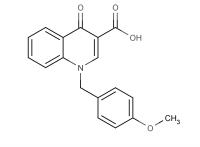
WINSTON-SALEM, N.C. - A fast-acting compound that appears to improve cognitive function impairments in mice similar to those found in patients with progressive Alzheimer's disease has been identified by scientists at Wake Forest University School of Medicine and the Vanderbilt University Medical Center Program in Drug Discovery. Researchers hope to one day replicate the result in humans.
The compound - benzylquinolone carboxylic acid (BQCA) - has also been shown in previous rodent studies to lessen the occurrence and severity of the behavioral disturbances often symptomatic of Alzheimer's, such as hallucinations, delusions, paranoia and outbursts.
"That makes this compound somewhat novel," said Michelle M. Nicolle, Ph.D., an associate professor of gerontology at Wake Forest and co-researcher on the study, published in the Journal of Neuroscience. "We wanted to see if this very specific acting compound was able to change the way the brain works and whether or not it improved memory in our 'Alzheimer's mice,' which are experiencing progressive cognitive decline much like a person with Alzheimer's does."
Other attempts to identify such a specific treatment for Alzheimer's have failed, according to Nicolle.
"Current treatments only treat the symptoms while the underlying disease is still progressing," she said, "so recent research efforts are focusing on stopping disease progression instead of symptomatic treatment."
The researchers' findings suggest that the compound could alter the progression of disease in mice and, ultimately, hold importance for humans, as well.
BQCA activates a specific neurotransmitter receptor in the brain called the M1 muscarinic acetylcholine receptor. M1 receptors have been the focus of research into treatment of Alzheimer's disease because they affect the part of the brain that stimulates the memory and learning functions the disease inhibits. Until now, scientists have not found a treatment selective enough to activate the receptors without producing side effects such as nausea, vomiting and increased frequency of urination.
But in this study, Nicolle said, researchers found that BQCA boosted the weak signals of the M1 receptors in a mouse model of Alzheimer's disease.
"In Alzheimer's disease, the chemical signals - the little bits of information that are talking to each other in the brain - are reduced, so you can't do the tasks very well," Nicolle said. "BQCA is only boosting an existing signal, so it's really specific in its action."
BQCA also seemed to inhibit production of amyloid beta, one of the markers of Alzheimer's disease in the brain - perhaps key to the compound's potential for slowing the progression of the disease.
Moreover, the compound works quickly, Nicolle explained. After just one administration of BQCA one hour before behavioral testing, mice were able to learn new ways to do tasks - in this case, finding a piece of hidden peanut butter chip in one of two small flower pots that looked the same but smelled different. One of the pots was made to smell like lemon, indicating the location of a food reward, namely the peanut butter chip. The other pot smelled like clove, a smell that if followed, would lead the mouse to a pot with no food reward. All mice learned to locate the peanut butter chip in the pot that smelled like lemon.
However, when the odor stimuli were switched, making clove the indicator of the peanut butter and lemon the indicator of no reward, the BQCA-treated "Alzheimer's mice" were able to forget the old rule and quickly learn the new rule to locate the chip in the clove-scented pot. The untreated Alzheimer's mice had difficulty learning the new rule and persisted in looking for the chip in the lemon-scented pot - a characteristic of impaired cognitive function known as "perseveration."
Tasks that require the replacement of old rules with new rules are categorized under the broad umbrella of cognition called "executive function" in humans. Examples of executive function such as planning, multitasking and activities of daily living, like cooking and getting dressed, are all capabilities that slip away as Alzheimer's disease progresses.
"In older people and in Alzheimer's disease patients, we call it flexible learning," Nicolle said. "They learn one rule, and they don't want to change the rule to get to the end goal."
Treatment with BQCA in mice allowed a previously learned rule to be replaced with a new one.
Because of the early indications that the compound could treat the behavioral symptoms associated with Alzheimer's, the researchers also believe BQCA could be targeted for treatment of schizophrenia. However, the compound will need further testing in the laboratory before it is ready for clinical trials with human participants.
The study was funded with grants from the National Institute of Mental Health, the National Institute of Neurological Disorders and Stroke, and the Alzheimer's Association.
Wake Forest University Baptist Medical Center is an academic health system comprised of North Carolina Baptist Hospital, Brenner Children's Hospital, Wake Forest University Physicians, and Wake Forest University Health Sciences, which operates the university's School of Medicine and Piedmont Triad Research Park. The system comprises 1,056 acute care, rehabilitation and long-term care beds and has been ranked as one of "America's Best Hospitals" by U.S. News & World Report since 1993. Wake Forest Baptist is ranked 32nd in the nation by America's Top Doctors for the number of its doctors considered best by their peers. The institution ranks in the top third in funding by the National Institutes of Health and fourth in the Southeast in revenues from its licensed intellectual property.
Further Information:
Jana K. Shirey et al.:
A Selective Allosteric Potentiator of the M1 Muscarinic Acetylcholine Receptor Increases Activity of Medial Prefrontal Cortical Neurons and Restores Impairments in Reversal Learning.
In: Journal of Neuroscience; Nov 2009; 29: 14271 - 14286, DOI 10.1523/JNEUROSCI.3930-09.2009
Quelle: Wake Forest University Baptist Medical Center, USA
Last update: 19.01.2010
Perma link: https://www.internetchemistry.com/news/2010/jan10/benzylquinolone-carboxylic-acid.php
More chemistry: index | chemicals | lab equipment | job vacancies | sitemap
Internetchemistry: home | about | contact | imprint | privacy
© 1996 - 2023 Internetchemistry
